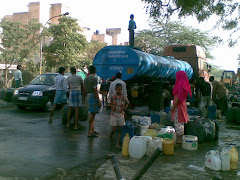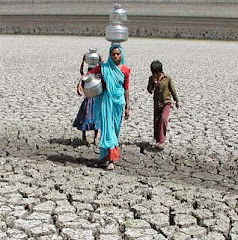As water pollution continues to play havoc with the world's dwindling water supplies, the search for innovative and low-cost purification technologies continues.
Some Canadian researchers have come across a tree found in several parts of Asia that could also provide another low-cost water purification technique to help bring down the incidence of waterborne disease in the developing world. This could be welcome news for Asia, as along with Africa, it remains one of the largest areas where water scarcity and pollution run hand-in-hand.
If one adds some parts of Latam (Latin America), then over a billion people reportedly rely on untreated surface water sources for their daily water needs. Reports suggest that almost two million die from diseases from contaminated water every year. Children under five years of age account for the largest number of deaths.
According to the researchers, a simple procedure that uses seeds from the Moringa oleifera tree can produce upto 99.99 per cent bacterial reduction in previously untreated water.
The seeds can be crushed into powder and used as a water-soluble extract in suspension, which creates an effective natural clarification agent for highly turbid and untreated pathogenic surface water.
The technique improves drinkability and reduces water turbidity (cloudiness), thus making water microbiologically and aesthetically acceptable for human consumption.
Showing posts with label water purification. Show all posts
Showing posts with label water purification. Show all posts
Wednesday, April 14, 2010
Monday, January 25, 2010
Pentair eyes home water management market in India, plans new unit
The $3.5-billion US-based Pentair Group has identified India as its biggest emerging market globally. The company is keen to make its mark in the fast growing home water management and water purification segments in India.
Like several other leading companies in the sector, Pentair also sees a slew of opportunities from source-to-sink in the water management category in the country.
The company's wholly-owned Indian subsidiary Pentair Water India has decided to set up a pump manufacturing unit in the country and is finalising a location for the same. It already has a sizeable presence in India, having made its entry in 1998.
So far, it has been active in the industrial water treatment segment in the country and had been supplying membranes to almost all water purifying companies in India. The company has been providing water treatment solutions for a range of industrial, commercial and institutional applications.
The company's existing manufacturing facility at Goa is also being used to export water treatment systems to West Asia markets. Now, it has decided to set up a new pump manufacturing unit at an estimated investment of Rs 20 crore. But, as of now, the company has not decided on the location for the manufacturing facility.
The company is looking at Pune, Coimbatore and Gujarat for the plant.
Pentair is ramping up its presence in India when the water and wastewater management industry has emerged as one of the most recession proof segments poised for growth over the next several years. Companies like Pentair also stand to benefit with several state governments stepping up investments in projects related to water infrastructure.
Like several other leading companies in the sector, Pentair also sees a slew of opportunities from source-to-sink in the water management category in the country.
The company's wholly-owned Indian subsidiary Pentair Water India has decided to set up a pump manufacturing unit in the country and is finalising a location for the same. It already has a sizeable presence in India, having made its entry in 1998.
So far, it has been active in the industrial water treatment segment in the country and had been supplying membranes to almost all water purifying companies in India. The company has been providing water treatment solutions for a range of industrial, commercial and institutional applications.
The company's existing manufacturing facility at Goa is also being used to export water treatment systems to West Asia markets. Now, it has decided to set up a new pump manufacturing unit at an estimated investment of Rs 20 crore. But, as of now, the company has not decided on the location for the manufacturing facility.
The company is looking at Pune, Coimbatore and Gujarat for the plant.
Pentair is ramping up its presence in India when the water and wastewater management industry has emerged as one of the most recession proof segments poised for growth over the next several years. Companies like Pentair also stand to benefit with several state governments stepping up investments in projects related to water infrastructure.
Tuesday, December 8, 2009
India's Tatas make foray in low-cost water purifier market
India's leading corporate Tata Group has launched a new low-cost water purifier targeted at the rural masses. The water filter is designed to be used in rural households that have no electricity or running water and would use ash from rice milling to filter out bacteria. The business group hopes it will provide safe drinking water for millions and cut the toll of deadly diseases.
The low-cost purifier will cost around Rs 1000 (or about $22) and should find easy acceptance among people in rural India. It's, of course, another matter that there are thousands of villages across India where water is just not available.
The scourge of water pollution not only affects India, but the entire world. According to the United Nations, more than one in six people worldwide, or 894 million, do not have access to clean water for their basic needs. Diarrhoea remains the leading cause of illness and death, particularly among children.
Nearly 90 per cent of deaths from diarrhoea are due to lack of sanitation, unsafe drinking water and water for hygiene. In India, 75 per cent of the rural population does not have access to safe drinking water.
The Tatas have befittingly called the new product Swatch (meaning pure, clear in Hindi). The product has come up after the group carried out extensive research. The group has reportedly invested Rs 1 billion in the project and set a target of selling three million units in the next five years.
A low-cost product is not new to the Indian market. The home water purification industry in India is a buoyant one and there are already several players, as also a few more low-cost water purifiers in the market. FMCG giant Hindustan Unilever had also rolled out its battery-operated Pureit model, which has a 4.5-litre capacity and can filter up to 1,500 litres.
Tata's Swatch has a 9.5-litre capacity and can filter 3,000 litres until the cartridge has to be replaced. The device uses tiny silver particles to kill harmful germs that can lead to diseases like diarrhoea, cholera and typhoid, something quite common in India.
The device meets the highest US Environmental Protection Agency standards and also removes micro-organisms, colour and odour. The group had tested it in 600 rural households across four Indian states before it was launched.
The low-cost water purifier market is expected to see some more roll-outs and product innovations in the years to come as water scarcity and pollution grow. It would also be a prudent business decision for all those in the industry, as the bottom of the pyramid offers a huge, huge potential market.
The low-cost purifier will cost around Rs 1000 (or about $22) and should find easy acceptance among people in rural India. It's, of course, another matter that there are thousands of villages across India where water is just not available.
The scourge of water pollution not only affects India, but the entire world. According to the United Nations, more than one in six people worldwide, or 894 million, do not have access to clean water for their basic needs. Diarrhoea remains the leading cause of illness and death, particularly among children.
Nearly 90 per cent of deaths from diarrhoea are due to lack of sanitation, unsafe drinking water and water for hygiene. In India, 75 per cent of the rural population does not have access to safe drinking water.
The Tatas have befittingly called the new product Swatch (meaning pure, clear in Hindi). The product has come up after the group carried out extensive research. The group has reportedly invested Rs 1 billion in the project and set a target of selling three million units in the next five years.
A low-cost product is not new to the Indian market. The home water purification industry in India is a buoyant one and there are already several players, as also a few more low-cost water purifiers in the market. FMCG giant Hindustan Unilever had also rolled out its battery-operated Pureit model, which has a 4.5-litre capacity and can filter up to 1,500 litres.
Tata's Swatch has a 9.5-litre capacity and can filter 3,000 litres until the cartridge has to be replaced. The device uses tiny silver particles to kill harmful germs that can lead to diseases like diarrhoea, cholera and typhoid, something quite common in India.
The device meets the highest US Environmental Protection Agency standards and also removes micro-organisms, colour and odour. The group had tested it in 600 rural households across four Indian states before it was launched.
The low-cost water purifier market is expected to see some more roll-outs and product innovations in the years to come as water scarcity and pollution grow. It would also be a prudent business decision for all those in the industry, as the bottom of the pyramid offers a huge, huge potential market.
Labels:
water filter,
water pollution,
water purification
Subscribe to:
Posts (Atom)

.jpg)


